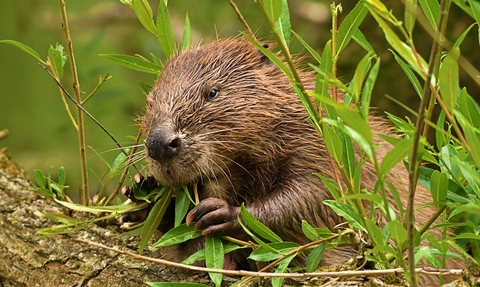
Sam Moore
Beaver Believers appeal
Devon Wildlife Trust wants to see beavers returned to every main river in Devon.
Over the next few years, we have a unique opportunity for Devon to become the first English county with established beaver populations thriving in multiple river catchments. But we need your help to realise this ambition.
For more than a decade DWT’s work has demonstrated just how much Devon’s rivers and wildlife will benefit from the return of the beaver. The abundance of wetland wildlife increases dramatically, water quality is improved as beaver dams filter sediment from the water, the most damaging peak flood flows are reduced, and dams gently release water in times of drought. In addition, beaver dams and wetlands lock up huge quantities of carbon!
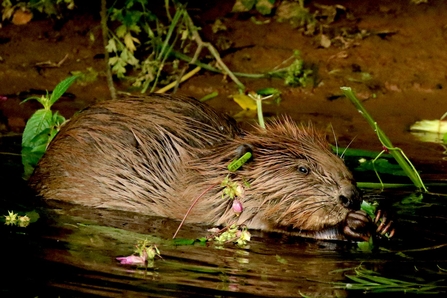
Male beaver on River Otter, photo David White
Eighteen months after the government announced that the River Otter beavers could stay, these amazing animals can be found throughout the main river and several tributaries. The government also agreed that beavers could naturally spread to neighbouring river catchments over time.
But what about other Devon rivers, 86% of which are not in good ecological condition?
There are ten other major river systems in the county where people and wildlife would benefit from beaver activity. To establish beavers on more Devon rivers safely for the long-term, DWT will work alongside local communities to understand the impacts that beavers have and how to deal with any conflicts between human and beaver uses of the landscape. Farmers and landowners need support and practical advice to help make space for beaver-created wetlands.
We also need to ensure future Devon populations are thriving, by introducing beavers from Scotland so closely related family groups are more genetically diverse.
Beaver kit. Photo, Mike Symes
The good news is that beavers are already present on two more Devon rivers. So, with your support, DWT’s beaver conservation staff can work in at least three Devon river catchments, sharing our knowledge and understanding of beavers’ behaviour, and providing the support and assistance local people might need to live alongside beavers again.
When government guidance is published on future beaver re-introductions, DWT will work with landowners and communities who are interested in introducing beavers to other Devon rivers.
DWT supporters have generously backed the River Otter beavers over the years. With no government funding available for DWT’s beaver conservation work, we need your help to raise at least £24,000 – this time your donation will be supporting the return of the beaver in rivers across Devon.
Fill in your details below to donate - or scroll down to read more detail on how and where DWT's beaver conservation work will be concentrated, and how your donation will help.
Beaver Believers appeal
Beavers on the Tamar (and in northern Devon)
For some years there has been a growing population of beavers in the Tamar catchment, with reports of beaver activity in many of the tributaries on both sides of the Devon-Cornwall border. As with the River Otter beavers, this represents an important opportunity to work alongside local people living close to the Tamar and its tributaries to ensure people and wildlife can benefit from this unexpected arrival.
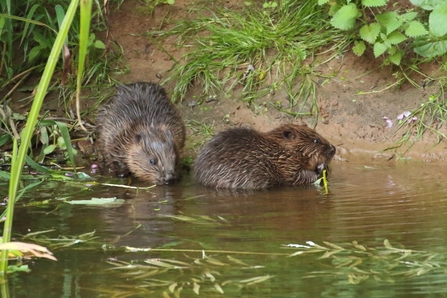
Mike Symes
DWT has also seen evidence of beaver activity on a tributary of the River Taw, extending the need for beaver conservation work to three different areas of the county.
With your support, our beaver conservation staff will be able to work directly with landowners where beavers are present, finding ways for them to benefit from making space for beaver-created wetlands, and providing practical interventions where beaver activity is causing unwanted impacts.
Your donation would also support introduction of beavers from Scotland to improve genetic diversity of the existing population.
Beaver Believers appeal
River Otter - getting beavers in the right places
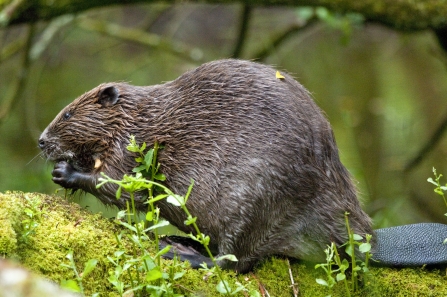
Devon beaver on mossy trunk by David Plummer
Beavers feel safest in deep water. So, the first places on the River Otter where beaver pairs set up territories were between Ottery St Mary and the upper tidal reaches of the river, where the water was deep and the bankside vegetation plentiful. But beavers can have the greatest positive impacts – on increasing abundance and diversity of wildlife, on improving water quality and alleviating the effects of flooding and drought – where they create dams to make areas of deeper water. And that takes place upstream, in the headwaters of a river and in its tributary streams.
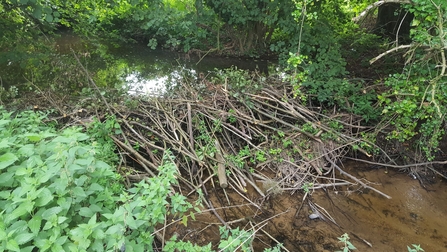
Beaver dam on River Tale
As the beaver population grows over the years, the animals will increasingly be part of these landscapes and start to build many more dams. But to address the wildlife loss and climate crises, we need to provide the right conditions for beavers to colonise the watercourses where they will deliver the greatest benefits.
The next stage in our work is to identify the best tributaries for beavers to be present, working alongside expert hydrologists from the University of Exeter. With your support, DWT can work alongside farmers and landowners to create optimal conditions for beavers to want to remain in these areas.
By planting bankside willows to provide both food and dam-building material, by starting to hold back water by creating woody-debris dams, and by digging ponds next to watercourses to encourage beavers to create their own dams and set up a lodge, we can make beaver-friendly habitats so these amazing animals can transform many more watercourses for the better.
Beaver Believers appeal
Beavers beyond boundaries
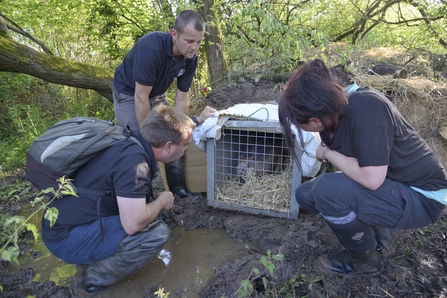
Photo, Nick Upton
Several Devon landowners have asked DWT about the possibility of returning beavers to local rivers
and streams. Once there is a legal framework in place to do this, DWT staff will be able to offer advice and learning from the River Otter Beaver Trial to support future re-introductions of nature’s water engineers.
Your donation today will support DWT’s beaver conservation team and help achieve our ambition to see beavers back in the wild across Devon. Thank you!
